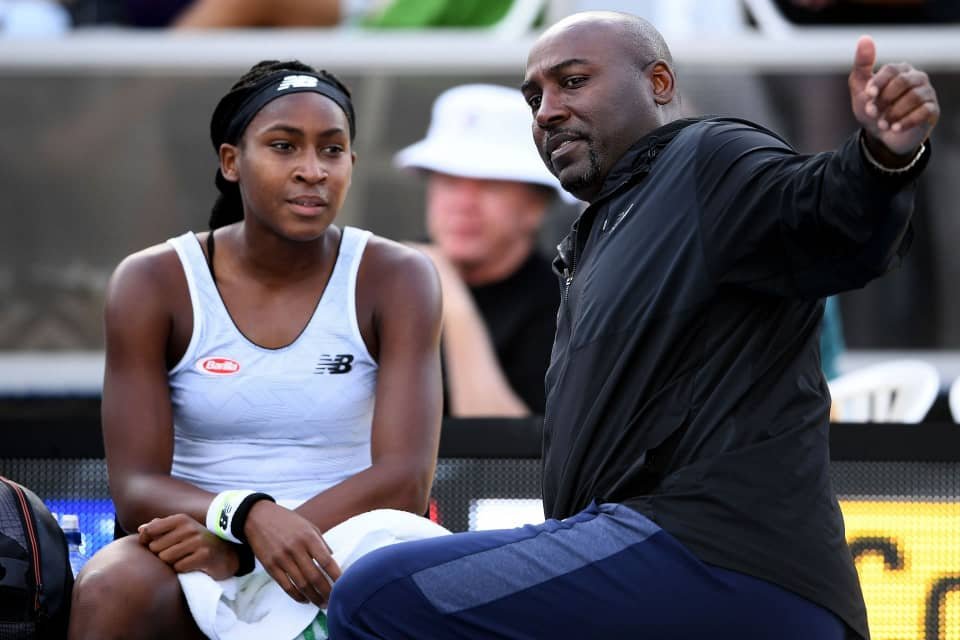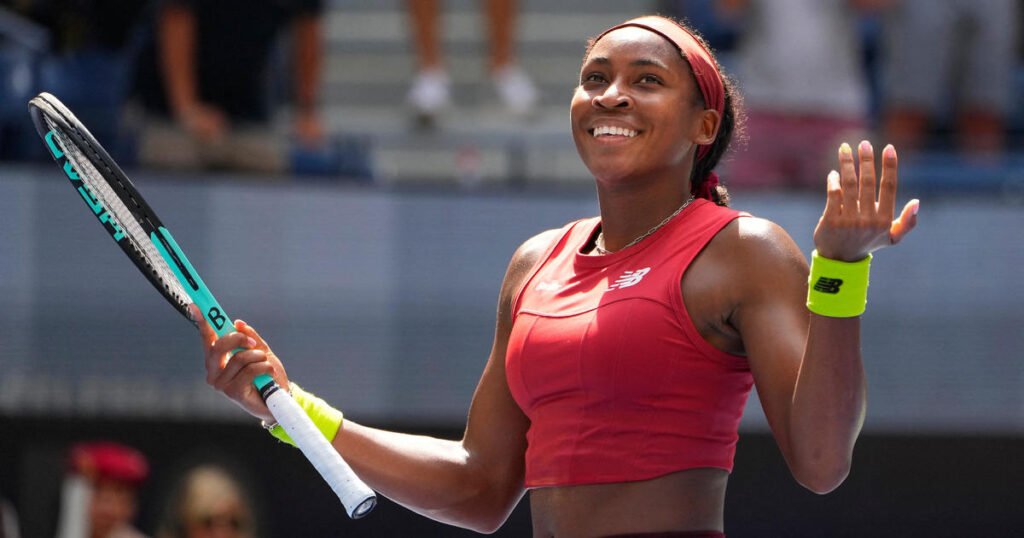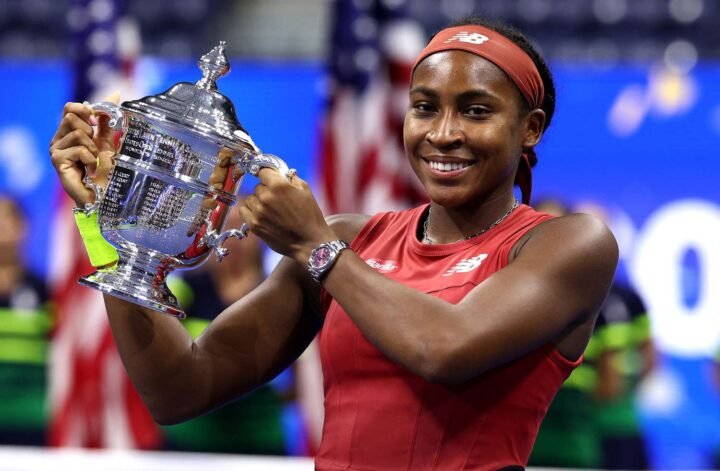Coco Gauff’s ascent to stardom is a story for the ages.
A viral video once captured an eight-year-old Gauff dancing with unbridled joy on the hallowed grounds of Arthur Ashe Stadium. Little did the world know that eleven years later, this same teenager would return to that very stadium, this time not as a spectator, but as a champion, holding the coveted US Open trophy aloft. Gauff’s remarkable journey from a 15-year-old sensation at Wimbledon in 2019 to a Grand Slam champion has been nothing short of spectacular. Her charisma, on and off the court, has captivated hearts, and with her recent victory over Aryna Sabalenka, she proved that she was destined for greatness all along.

The momentous victory over Aryna Sabalenka, with a scoreline of 2-6, 6-3, 6-2, was the culmination of years of hard work, dedication, and unshakable belief. As Coco Gauff held the microphone after the victory, her speech was not just accomplished but deeply heartfelt, touching upon every aspect of her journey. She unveiled the secret of her father Corey’s emotional celebration, cheekily remarking, “he thinks he is hard.” Gauff didn’t shy away from acknowledging the doubters, stating, “I want to say ‘thank you’ to the people who didn’t believe in me. I tried my best to carry on with grace, but, honestly, to those who thought you were putting water on my fire, you were really adding gas to it. I’m burning so bright right now.”

In her speech, she expressed gratitude to her parents, grandparents, coaches, and the roaring crowd, emphasizing the importance of her faith. An endearing touch was her tribute to Billie Jean King, a pioneering major champion who fought tirelessly for gender equality in tennis, and Gauff acknowledged her role in enabling her to claim the $3 million prize pot. She even attempted to call one of her brothers during the trophy ceremony, but the overwhelming noise in the stadium forced her to hang up, a testament to the electric atmosphere that surrounded her achievement.
For Coco Gauff, the spotlight has been her constant companion from a tender age. As she confessed, “I feel like this is a big achievement, but honestly, I feel like I’ve been so used to being in the public eye since I was basically 15 years old in high school.” With grace and poise, she embraced the pressure, asserting, “I think the pressure has been taken off a little bit and I still am hungry for more.”
Gauff’s appeal goes beyond her tennis prowess; it’s her engaging personality that sets her apart. She possesses that intangible quality, star quality, which cannot be taught or learned. Gauff doesn’t merely embrace her voice; she wields it with power. She has been an outspoken advocate against racial injustice and gun violence in the United States, using her platform to drive change.
If a single image could speak a thousand words, it would be the sight of Gauff, disheartened and drained, leaving the Wimbledon court after a humbling first-round defeat to Sofia Kenin. Her usual effervescence had momentarily faded, replaced by frustration and disappointment. Gauff’s response to the loss was clear and resolute: she needed to go back to the drawing board and work harder.
Two months later, she emerged transformed. Gauff’s journey to redemption saw her secure a maiden Grand Slam title with a triumph over Aryna Sabalenka. Her remarkable run during the North American hard-court swing, which included victories in Washington and Cincinnati, showcased her growth and determination. Gauff revealed, “I felt like people were saying ‘Oh, she’s hit her peak and she’s done. It was all hype.’ I see the comments. People don’t think I see it, but I see it. I know who’s talking trash. So this means a lot to me. I wish I could give this trophy to my past self so she can be like ‘All those tears are for this moment’.”
When Coco Gauff burst onto the scene at Wimbledon in 2019, the tennis world was abuzz with predictions about her future. While some expected quick success, others recognized that her journey would involve maturing on the court and refining her game on the WTA Tour. Gauff’s progress had been steady but significant, with a top-10 ranking secured over the past year, although major titles had remained elusive.
The turning point came when she triumphed in Washington, D.C., a victory that bolstered her confidence and solidified her belief that she belonged among the tennis elite. Her coach, Jarmere Jenkins, noted her newfound mental, spiritual, and emotional solidity. “Coco has always belonged. She has always proven she is meant for the big lights,” he affirmed.

A vital part of Gauff’s resurgence can be attributed to her coaching team, carefully assembled to provide the guidance and belief she needed. Spaniard Pere Riba, a seasoned coach who previously worked with Zheng Qinwen, heads the staff. Brad Gilbert, celebrated for his role in shaping Andre Agassi’s career and mentoring Andy Murray, joined as a consultant. Jenkins, a former hitting partner of Serena Williams, was another valuable addition.
The collaboration of these experienced mentors instilled confidence in Gauff. Jenkins explained, “Having all these experiences in one team really gave her a boost of confidence. It enabled her to think: ‘These guys know what they’re talking about, and I trust what they’re saying. All I have to do is listen, apply it, and execute it’.”

Contrary to popular belief, it was not a major technical overhaul that propelled Gauff to victory; rather, it was the belief, confidence, and faith instilled by her coaches. Jenkins clarified, “It was never about the technique. It was about the belief, the confidence, and the faith.”
Amidst the intense competition, Brad Gilbert played a pivotal role in Gauff’s success. The former player, famous for his book “Winning Ugly: Mental Warfare in Tennis,” helped Gauff navigate the psychological challenges of the game. Gauff’s ability to overcome adversity and come from behind in several matches at the US Open showcased her newfound mental strength.
Jenkins noted, “When you’re confident and clear in what you’ve got to do, it puts your mind at ease.” He emphasized that Gauff no longer merely hopes to play well but enters each match with the conviction that she can win, regardless of the circumstances.
Moreover, the chemistry within the team, both on and off the court, has been a key factor. Gauff’s ease with her coaches and their shared camaraderie has created a positive and supportive environment for her. Music choices during car rides, reflecting their diverse tastes, exemplify the harmony within the team.
As a young, exceptionally talented black American tennis player, Coco Gauff has frequently drawn comparisons to Serena and Venus Williams. Her recent US Open victory placed her in a unique category, as she became the first
First American teenager since Serena Williams in 1999 to win the tournament.

When asked about this accomplishment, Gauff expressed her gratitude, stating, “Yes, it’s crazy. I mean, they’re the reason why I have this trophy today, to be honest. They have allowed me to believe in this dream growing up.” She acknowledged the trailblazing role that the Williams sisters played in opening doors for players like her, who aspire to make their mark in the world of tennis.
From the joyous dance of a young girl in Arthur Ashe Stadium to the triumphant champion lifting the Grand Slam trophy, her story is one of inspiration and achievement. With her engaging personality, powerful voice, and newfound mental strength, Coco Gauff is not just a tennis star; she’s a role model for the next generation of athletes, showing that dreams, when pursued with passion and perseverance, can indeed come true.





